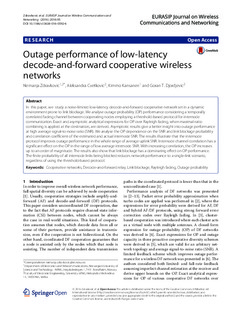Outage performance of low-latency decode-and-forward cooperative wireless networks
Journal article, Peer reviewed
Published version
Permanent lenke
http://hdl.handle.net/11250/2645217Utgivelsesdato
2016Metadata
Vis full innførselSamlinger
Originalversjon
EURASIP Journal on Wireless Communications and Networking. 2016, 2016 (1), . 10.1186/s13638-016-0592-6Sammendrag
In this paper, we study a noise-limited low-latency decode-and-forward cooperative network set in a dynamic environment prone to link blockage. We analyse outage probability (OP) performance considering a temporally correlated fading channel between cooperating nodes employing a threshold-based protocol for internode communication. Exact and asymptotic analytical expressions for OP over Rayleigh fading, when maximal-ratio combining is applied at the destination, are derived. Asymptotic results give a better insight into outage performance at high average signal-to-noise ratio (SNR). We analyse the OP dependence on the SNR and link blockage probability and correlation coefficient of the estimated and actual internode SNR. The results illustrate that the internode protocol improves outage performance in the whole range of average uplink SNR. Internode channel correlation has a significant effect on the OP in the range of low average internode SNR. With increasing correlation, the OP increases up to an order of magnitude. The results also show that link blockage has a dominating effect on OP performance. The finite probability of all internode links being blocked reduces network performance to a single-link scenario, regardless of using the threshold-based protocol.

